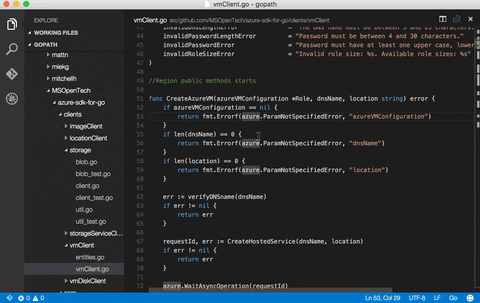| commit | 6604cf2288ab938c81120b237c44a76e3d02bed3 | [log] [tgz] |
|---|---|---|
| author | Luke Hoban <lukehoban@gmail.com> | Fri Nov 20 14:14:25 2015 -0800 |
| committer | Luke Hoban <lukehoban@gmail.com> | Fri Nov 20 14:14:25 2015 -0800 |
| tree | 3ece8f10d608f3ede2c3e245ceb8d9ecf346c7b3 | |
| parent | 6ce5354d8dbcaa6dbd5ecb89a700290c0c056995 [diff] |
Clean up some formatting
This extension adds rich language support for the Go language to VS Code, including:
gocode)godef)godef)go-find-references)go-outline)gorename)go build and go test)goreturns or goimports or gofmt)delve)

First, you will need to install Visual Studio Code 0.10. In the command palette (cmd-shift-p) select Install Extension and choose Go.
In a terminal window with the GOPATH environment variable set to the GOPATH you want to work on, launch code. Open you GOPATH folder or any subfolder you want to work on, then open a .go file to start editing.
Note: It is strongly encouraged to turn Auto Save on in Visual Studio Code (File -> Auto Save) when using this extension. Many of the Go tools work only on saved files, and error reporting will be more interactive with Auto Save turned on.
The following Visual Studio Code settings are available for the Go extension. These can be set in user preferences (cmd+,) or workspace settings (.vscode/settings.json).
{ "go.buildOnSave": true, "go.lintOnSave": true, "go.vetOnSave": true, "go.formatTool": "goreturns", "go.gopath": "/Users/lukeh/go" }
To use the debugger, you must currently manually install delve. See the Installation Instructions for full details. This is not yet supported on Windows, and on OS X it requires creating a self-signed cert to sign the dlv binary.
Once this is installed, go to the Code debug viewlet and select the configuration gear, placing the following in your launch.json:
{ "version": "0.1.0", "configurations": [ { "name": "Launch main.go", "type": "go", "request": "launch", "program": "main.go", "stopOnEntry": false, "env": {}, "args": [], "cwd": "." } ] }
You can set up a development environment for debugging the extension during extension development.
First make sure you do not have the extension installed in ~/.vscode/extensions. Then clone the repo somewhere else on your machine, run npm install and open a development instance of Code.
rm -rf ~/.vscode/extensions/lukehoban.Go cd ~ git clone https://github.com/Microsoft/vscode-go cd vscode-go npm install code .
You can now go to the Debug viewlet and select Launch Extension then hit run (F5).
In the [Extension Development Host] instance, open your GOPATH folder.
You can now hit breakpoints and step through the extension.
If you make edits in the extension .ts files, just reload (cmd-r) the [Extension Development Host] instance of Code to load in the new extension code. The debugging instance will automatically reattach.
To debug the debugger, see the debugAdapter readme.
The extension uses the following tools, installed in the current GOPATH. If any tools are missing, the extension will offer to install them for you.
go get -u -v github.com/nsf/gocodego get -u -v github.com/rogpeppe/godefgo get -u -v github.com/golang/lint/golintgo get -u -v github.com/lukehoban/go-find-referencesgo get -u -v sourcegraph.com/sqs/goreturnsgo get -u -v golang.org/x/tools/cmd/gorenameTo install them just paste and run:
go get -u -v github.com/nsf/gocode go get -u -v github.com/rogpeppe/godef go get -u -v github.com/golang/lint/golint go get -u -v github.com/lukehoban/go-find-references go get -u -v sourcegraph.com/sqs/goreturns go get -u -v golang.org/x/tools/cmd/gorename
And for debugging: